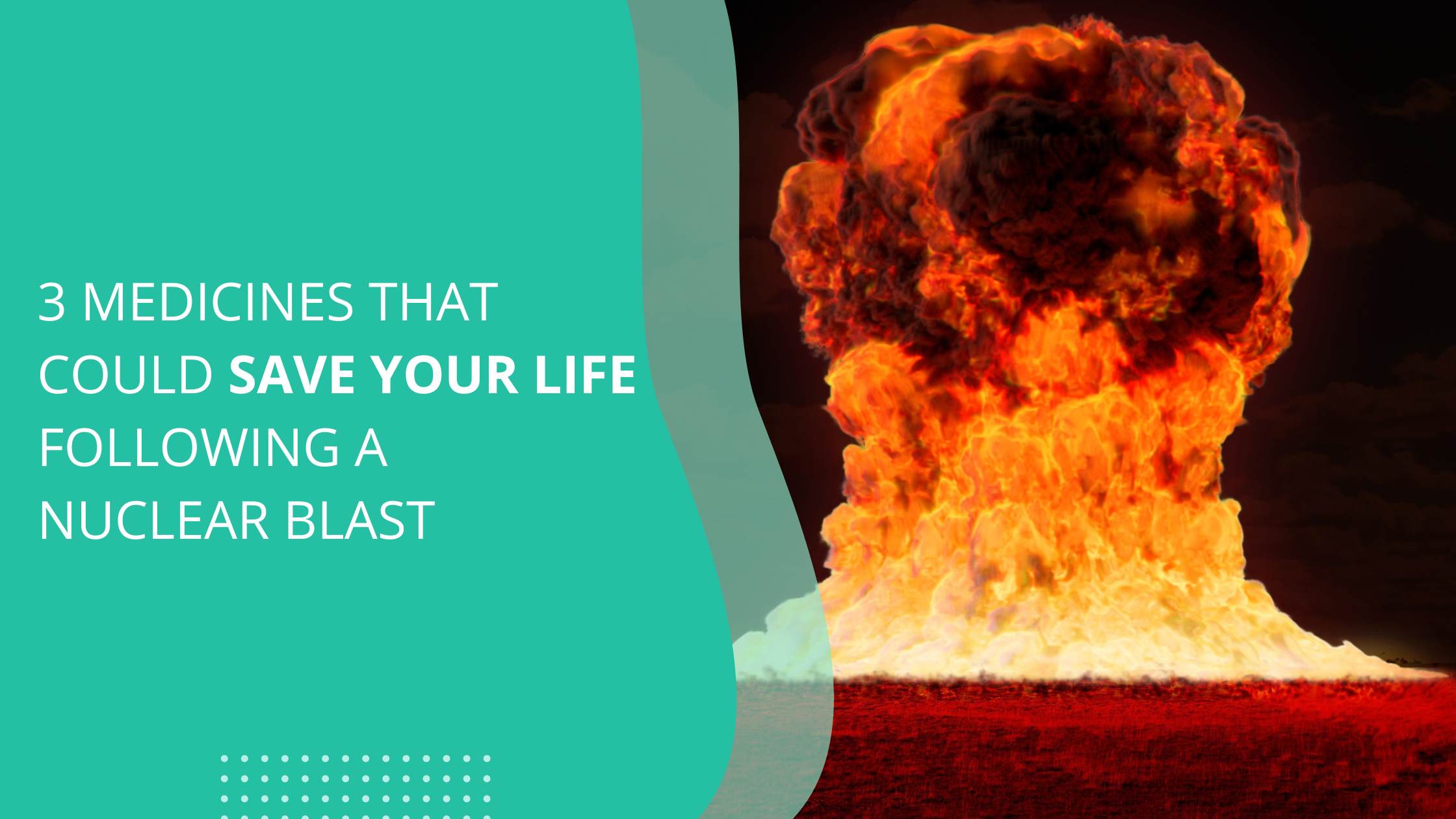
As the Russian-Ukraine war escalates, with no end in sight, the threat of nuclear war is ever present. At different times both sides have brought up the possibility of a “limited nuclear war.
We have never been so close to nuclear war- even during the cold war we weren’t this close.
The number of nuclear warheads in use is staggering. It is estimated that there are 12,705 nuclear warheads worldwide. These warheads are spread out between only 9 countries- U.S., Russia, France, China, the UK, Pakistan, India, Israel, and North Korea, Hopefully, cooler heads will prevail, and we will soon see a de escalation of tensions.
Preventing exposure-be prepared
Unfortunately, if a nuclear war is fought in Ukraine the radioactive fallout will travel through wind currents and eventually reach the United States. Some of the radioactivity will have dissipated, but a lot wont.
It is always better to prevent exposure to radioactive materials and fallout than to have to deal with the health effects of radiation exposure. In previous posts I outlined precautions and preparation tips to help you mitigate and decrease your exposure to radioactive fallout.
In this post, we will discuss three of the more common medicines available in the event of a nuclear blast. Whether the drug is over the counter or prescription, it is highly advised to only take as directed by health officials and in the proper amount. Even OTC meds have serious side effects if not taken as directed.
The three we will discuss are: Potassium iodide, Prussian Blue and EDTA.
Potassium iodide (KI)
(Over the counter, however, seek care provider guidance on how and when to take)
The thyroid gland cannot tell the difference between stable and radioactive iodine. KI acts to block radioactive iodine from being taken into the thyroid gland, it can help protect this gland from injury. Ingesting iodide tablets (KI) flood the thyroid gland and can protect the thyroid gland from absorbing the radioactive iodine from a nuclear incident.
It is also important to know what KI cannot do. KI cannot protect parts of the body other than the thyroid from radioactive iodine. KI cannot protect the body from any radioactive elements other than iodine. If radioactive iodine is not present, then taking KI is not protective.
How to take potassium iodide
Only take potassium iodide if state or local health authorities suggest you do so. During an emergency, health officials will send out an announcement. Your health department will then tell you when it’s OK to take potassium iodide. They’ll also tell you when you can stop the medication.
Excerpt from FDA recommendations:
How much potassium iodide (KI) should I take?
The FDA has approved two different forms of KI—tablets and liquid—that people can take by mouth after a nuclear radiation emergency. Tablets come in two strengths, 130 milligram (mg) and 65 mg. The tablets are scored so they may be cut into smaller pieces for lower doses. Each milliliter (mL) of the oral liquid solution contains 65 mg of KI. According to the FDA, the following doses are appropriate to take after internal contamination with (or likely internal contamination with) radioactive iodine:
- Adults should take 130 mg (one 130 mg tablet OR two 65 mg tablets OR two mL of solution). Children who are adult size (greater than or equal to 150 pounds) should take the full adult dose, regardless of their age.
- Women who are breastfeeding should take the adult dose of 130 mg.
- Children between 3 and 18 years of age should take 65 mg (one 65 mg tablet OR 1 mL of solution).
- Infants and children between 1 month and 3 years of age should take 32 mg (½ of a 65 mg tablet OR ½ mL of solution). This dose is for both nursing and nonnursing infants and children.
- Newborns from birth to 1 month of age should be given 16 mg (¼ of a 65 mg tablet or ¼ mL of solution). This dose is for both nursing and nonnursing newborn infants.
- NOTE: Newborn infants should only be given potassium iodide under the direction of a healthcare provider. Their underdeveloped thyroid is at risk for developing low thyroid. Thyroid function tests are indicated after iodide has been administered and the radioactive event has passed.
Medical conditions in which taking potassium iodide may be harmful:
Taking KI may be harmful for some people because of the high levels of iodine in this medicine.
You should not take KI if:
- you know you are allergic to iodine (If you are unsure about this, consult your doctor.
- A Seafood or shellfish allergy does not necessarily mean that you are allergic to iodine.
- Certain skin disorders (such as dermatitis herpetiformis or urticaria vasculitis).
- People with thyroid disease (for example, multinodular goiter, Graves’ disease, or autoimmune thyroiditis)
Food and Drug interactions
There are no known food or drug interactions when taking potassium iodide
Side Effects of potassium iodide
When taken as directed KI has few side effects.
Some of the more common side effects are:
- Skin rashes
- Inflammation of the salivary glands
- GI upset
Prussian Blue (COMMON BRAND NAME(S): Radiogardase
(By prescription only)
Note- Do NOT ingest Prussian blue pigment sold commercially, this practice is dangerous and potentially harmful.
Prussian blue is a pill that may be used in a radiation emergency to help remove radioactive cesium and thallium from the body. Prussian blue traps radioactive cesium and thallium in the intestines and keeps them from being reabsorbed by the body. Prussian blue decreases the half-life of cesium by 33% and from 3.8 to 2.2 days for thallium, The rate of cesium and thallium elimination is proportional to the dose and duration of Prussian blue.
Prussian blue comes in capsule form, and can be taken with or without food, however it is advised to take with food to stimulate secretion of cesium or thallium.
Treatment should be initiated as soon as possible after contamination is suspected. Even when delayed, treatment is effective and should not be withheld.
For oral dosage form (capsules):
For cesium poisoning:
- Adults and teenagers—3 grams (6 capsules) three times a day.
- Children 2 to 12 years of age—1 gram (2 capsules) three times a day.
- Children younger than 2 years of age—Use and dose must be determined by your doctor.
For thallium poisoning:
- Adults and teenagers—3 grams (6 capsules) three times a day.
- Children 2 to 12 years of age—1 gram (2 capsules) three times a day.
- Children younger than 2 years of age—Use and dose must be determined by your doctor.
Notify your care provider before taking if:
- You are pregnant or nursing.
- Have any allergic reactions to Prussian blue coloring in foods or medications.
- Arrhythmia (heart rhythm problem) or
- Electrolyte imbalance—Use with caution. May make these conditions worse.
- Blockage of the intestines or constipation
- Stomach or bowel problems—May increase risk for constipation.
- Liver disease—May not work properly in patients with this condition
Treatment may last 30 days or longer.
Food and Drug interactions
There are no known food interactions.
The absorption of many drugs decreases when Prussian blue is added. Some of these are:
- Carbidopa
- Ciprofloxacin
- Doxycycline
- For a complete list check out this site:
Side effects that you should report to your doctor or health care professional as soon as possible:
- Skin rash, itching or hives, swelling of the face, lips, or tongue
- Fast, irregular heartbeat
- Muscle pain or weakness, cramps
Mild side effects:
- blue colored stools
- constipation
- upset stomach
NOTE: You can now add Potassium Iodide and Prussian Blue to any Jase Case order as an add-on medication. Order now at https://jasemedical.com/case while supplies last.
EDTA
A prescription medicine, given by injection into the vein (intravenously) or into the muscle (intramuscularly) when used to treat radiation and lead poisoning. It is also found in pill form.
In addition to treating poisonings by radioactive materials such as plutonium, thorium, uranium, and strontium, EDTA is used to treat lead poisoning and brain damage caused by lead poisoning.
EDTA has many other uses, from treating calcium deposits in the eye (eyedrops) to high calcium levels in the blood (hypercalcemia) and treating heart rhythm problems.
Drug and food interactions
Allergy to EDTA has been reported, however no interactions with food
Drugs: There are 21 known drug interactions with EDTA
Side effects
- EDTA is safe when used as a prescription medicine, as eye drops, and in small amounts as a preservative in foods.
- EDTA can cause abdominal cramps, nausea, vomiting, diarrhea, headache, low blood pressure, skin problems, and fever.
- It is UNSAFE to use more than 3 grams of EDTA per day, or to take it longer than 5 to 7 days. Too much can cause kidney damage, dangerously low calcium levels, and death.
Special Precautions and Warnings(From RX List website):
- Pregnancy and breast-feeding: EDTA seems to be safe when used in food amounts. The safety of larger amounts is unknown.
- Asthma: Nebulizer solutions containing disodium EDTA as a preservative can cause the breathing tubes to narrow in some people with asthma. The size of the dose determines the amount of the narrowing.
- Heart rhythm problems: EDTA might make heart rhythm problems worse.
- Diabetes: EDTA might interfere with blood sugar control because it can interact with insulin.
- Low calcium levels in the blood (hypocalcemia): EDTA can decrease serum calcium levels, making hypocalcemia worse.
- Low potassium (hypokalemia): EDTA can bind with potassium and increase the amount of potassium that is flushed out in the urine. This might cause potassium levels to drop too low, especially in people who have low levels to begin with. If you have this problem, don’t use EDTA.
- Low magnesium levels in the blood (hypomagnesemia): EDTA can bind with magnesium and increase the amount of magnesium that is flushed out in the urine. This might cause magnesium levels to drop too low, especially in people who have low levels to begin with. If you have this problem, don’t use EDTA.
- Liver problems and hepatitis: EDTA might make liver disease worse. Avoid using EDTA if you have a liver condition.
- Kidney problems: EDTA can harm the kidney and might make kidney disease worse. EDTA doses should be reduced in patients with kidney disease. Avoid using EDTA if you have severe kidney disease or kidney failure.
- Seizures (epilepsy): There is some concern that EDTA might increase the risk of seizure in people with epilepsy or in people who tend to have seizures. EDTA can cause severe decreases in blood levels of calcium, and this can cause a seizure.
- Brooke Lounsbury, RN
Medical Content Writer

Lifesaving Medications
Recent Posts
Keeping you informed and safe.
FAQ: Our most commonly asked questions about Jase
If you’re considering Jase, chances are you’ve paused and thought, “This makes sense, but I still have a few questions.”You’re not alone. Here are the most common ones we hear, answered plainly. Is this really doctor-prescribed? Yes. Every Jase order is reviewed by a...
Medical Readiness: What Really Kills First
When Disaster Strikes, It’s Not Hunger or Thirst That Takes the First Lives In every disaster zone, from hurricanes in the Caribbean to war zones in Ukraine, the pattern is the same. People worry about food and water, but it’s infection that kills first. A small wound...
Exploring Dr. William Makis’ Hybrid Orthomolecular Cancer Protocol: Focus on Ivermectin and Mebendazole/Fenbendazole
Exploring Dr. William Makis’ Hybrid Orthomolecular Cancer Protocol: Focus on Ivermectin and Mebendazole/Fenbendazole *Disclaimer: This article is for educational purposes and does not constitute medical advice. Always seek professional guidance.* In the evolving...



